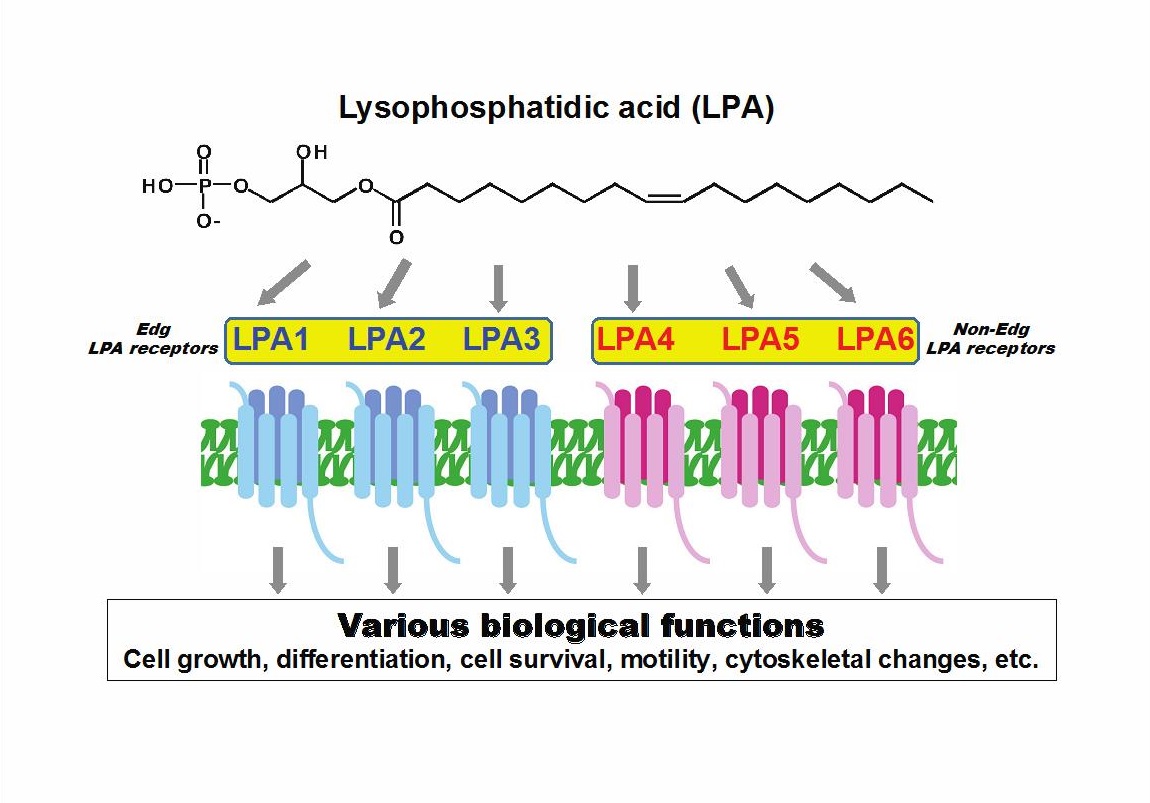Division and Department
Department of Immunology

Satoshi ISHII, Ph.D.
A Greeting from the Professor
In February 2010, our lab started with research projects aiming at detailed understanding of (patho)physiological roles for lipid mediators along with the underlying molecular mechanisms. We use various experimental approaches ranging from molecular biology, biochemistry, cell biology to mouse genetics.
Lipid mediators
Lipids are a diverse family of hydrophobic biomolecules that contain long-chain fatty acids or related hydrocarbon chains. Sterols and related compounds are also classified as lipid molecules. The main biological functions of lipids include serving as nutrients, energy storage and structural components of cell membranes. Notably, some lipid molecules function as intercellular and intracellular signaling molecules. The former include prostaglandins, leukotrienes, platelet-activating factor (PAF), lysophosphatidic acid (LPA), sphingosine 1-phosphate (S1P) and 2-arachidonoylglycerol as well as others, and are collectively referred to as “lipid mediators”. We are interested in the biological role of lipid mediators, especially in that of LPA.
Background of LPA research and our projects
LPA is a pluripotent lipid mediator with various biological functions including cell growth, differentiation, survival, motility, and cytoskeletal morphology (see the figure). LPA is known to be a major growth factor in serum, and significant amounts of LPA can be detected in other body fluids as well. LPA exerts its biological functions through binding and activation of multiple G protein-coupled receptors (GPCRs) localized in the plasma membrane of target cells. Originally, the functions of LPA were thought to be elicited exclusively by three subtypes of the endothelial differentiation gene (Edg) family of GPCRs – LPA1, LPA2 and LPA3. These receptors do mediate some biological effects of LPA including chemotactic and mitotic activities, but several biological activities of LPA could not be assigned to the Edg family LPA receptors reflecting the existence of additional, non-Edg LPA receptor(s). In 2003, we identified the first phylogenetically distant, non-Edg LPA receptor, LPA4 (Noguchi K. et al. J. Biol. Chem. [2003]), and subsequently two additional LPA receptors (LPA5 and LPA6) were discovered. These three receptors share 35–55% amino acid identity with each other and constitute the non-Edg family LPA receptors. This novel cluster of LPA receptors enabled us to fill in gaps in the LPA bioactivities that could not be accounted for by the classical Edg family LPA receptors, such as vascular development (mediated by LPA4; Sumida H. et al. Blood [2010]) and endothelial hyperpermeability (mediated by LPA6; Yanagida K. et al. J. Biol. Chem. [2009]). Furthermore, our ongoing studies of non-Edg family LPA receptors are unveiling new and unexpected biological functions of LPA and deepening our understanding of LPA signaling. The goal of our research is to illuminate new opportunities where targeting non-Edg LPA receptors may provide therapeutic benefits.

Graduate students
Ambitious individuals interested in our research are welcome to apply for entrance to the graduate course in our department. Candidates should have completed a 6-year course in medicine, pharmaceutical science or veterinary science, or have a master’s degree (M.S.) or its equivalent. English speaking and writing abilities are especially important, and will be evaluated in the entrance examination. Additional information can be obtained by contacting Prof. Satoshi Ishii.
Staff
Satoshi ISHII, Ph.D.
Lecturer:
Daisuke Yasuda, Ph.D.
Technical Staff:
Nana Sato
Secretory:
Yasuko Okazaki
Research Areas
- Establishment of (patho)physiological roles for lysophosphatidic acid (LPA)
- Characterization of intracellular signaling pathway of LPA receptors
- Identification of novel G-protein-coupled receptors for lipid mediators
Contact Information
1-1-1 Hondo, Akita, 010-8543, Japan
Phone: +81-18-884-6091
Fax: +81-18-884-6444
E-mail: satishii@med.akita-u.ac.jp




